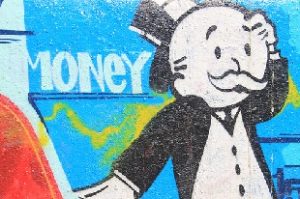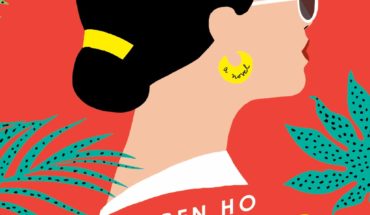
“Money!” (CC BY 2.0) by ToGa Wanderings
When author circles inevitably talk about what it is they need to write—two hours of Pilates, a stiff glass of Johnnie Walker Blue, a nap—I go quiet in a squirmy kind of way. When I’m told I should really travel or go on retreats in order to inspire my craft, I nod politely. When I network over a drink, I try to hide the fact that I’m counting dollars in my head, including the bus fare still required to get back home.
I came to terms with the fact that professional writing is a rich people’s pursuit long ago. And I ain’t rich.
I’m part of a different kind of background; dumpster-diver kings and multi-shift princesses. Empty-bellied royalty. People who work three jobs at minimum wage and no health insurance while dodging dudes who want to trick with us for a few dollars.
Publishing has always been a harsh game. Its economically sensible world has consistently swayed in the direction of the mainstream and people with disposable income, but the current days of expectant self-promotion and fast-food profits seem to have brought the competition to a particular pustule.
While racism and sexism and queerphobia can still abound in which author gets chosen for representation and which doesn’t, success ultimately seems to boil down to one thing: if you don’t have the money, you don’t stand a chance.
This realization truly sunk in years back when I worked one of my part-time jobs, which was sprinkled with opportunities to serve successfully published authors. I always had the nerve to ask them how they’d made it. And while I’m eternally grateful for both their generosity in answering me and the honesty of their answers, their patterns were damn disheartening.
It turns out getting published these days has very little to do with talent. Or even work ethic. (Your success as a writer may have some stock in these things, but actually getting published doesn’t.)
In order to be published, you need to either have 1) the money to throw down, or 2) influential contacts that can push you past the swollen queue. People in poverty rarely have these things. We have no disposable income and the only contacts we have are equally poor; working-class stiffs with no influence in a place as lofty as an agency or publishing house. No friends-of-a-friend. No successful aunts who can walk us through the craft. No recent grads willing to build us professional-looking websites for a reduced rate. No time to keep up an online media persona or write for free in the hopes that we nab enough exposure to be considered worth the financial risk of print.
You need to put in a considerable amount of dollars (and time, which for people like me equals even more dollars) to have a remote chance of being taken seriously, of getting noticed.
And when a starry-eyed writer really does get noticed? Really does get published? Then there’s the time you need to take off from work for book signings and tours, for interviews and crashing modest book clubs. And more networking. Always more networking. All for a payout that, as most published authors will tell you, amounts to pretty much dick.
People on my side of the tracks often can’t afford to promote themselves, which is a vital pulse both before and after a book deal. So most of us continue to sit on the sidelines. Sure, someone with disposable income may never make it as an author either, but we as the poor rarely even get the chance to fail. The public usually only gets to hear our impoverished, inspiration-porn stories when we happen to no longer be in the muck, which in turn often only happens out of leprechaun gold.
Chris Gardner of The Pursuit of Happyness got famous and wrote his memoir after he was already rolling in it.
For Hand to Mouth, Linda Tirado got the opportunity to write the book after her exhausted rant to a toxic comment online went unexpectedly viral, and she was given the time and money to properly pen something to be ironically capitalized on.
And then, of course, there’s the immortal story of JK Rowling, which we all—rich and poor alike—cling to desperately as being our chance. But the reason her story is so famous is because we all know how impossible it is; it’s never going to happen again.
So why do poor people write? Why, when we’re so bogged down with jobs and stress and worry, and have little-to-no chance to ever have our words read by the masses, do we still chug along with prose?
Because, in this regard, we’re no different than the rest of the writing community. We write because we’re possessed to do so. We can’t stop. We already don’t sleep or eat in order to work constantly, so what’s another 30 minutes of that? If it’s something that makes us happy in its own way? If it’s something that lets us escape the drudgery of our lives for a minute? Of hungry stomachs and cold apartments? If it’s something cathartic?
We’re all masochists in some shape or form, and this is just how poor writers like to go about it. It’s cruel to be given such an urge to write when you know deep down you’re too small to ever play in the big leagues, but we can’t help ourselves. We write in order to preserve our sanity. Also, dreams are just plain free.
But jotting down thoughts is something many of us believe is as far as we’re going to get.
Take me. By some bizarre court of miracles, I’m in the Novel Incubator program at Grub Street. But despite how bad I wanted it, I applied at the last minute. I applied as if I didn’t care. If I pretended I didn’t care, then I wouldn’t feel so bad when they rejected me. And I also wouldn’t feel so bad in the off chance they’d accept me; when I’d consequently have to turn them down simply because it cost more money than I had.
The day of my acceptance letter was tough as balls. “Fucking hell,” I thought. “Why do I do these things to myself?” Turns out when you have the letter right in front of your face, it’s much, much harder to turn away than the hypothetical sort.
But Grub Street was kind to me. They pride themselves on doing what they can to bring in writers from all walks of life, encouraging as many voices as possible in whatever way they can. And so this rare little fairy godmother of a writers’ hub helped me. I wouldn’t have made it this far if it wasn’t for them.
I’m certainly doing everything I can to make the remaining ends meet, but saying it’s tough is an understatement. I’m thankful to be currently living about two steps above poverty, but this is always a temporary high. I tend to bounce back and forth depending on how my luck is running because, well, that’s the way poverty’s built. All it’ll take is one job loss. One discriminatory landlord. One particularly bad flu.
And then there’s the guilt. I constantly question my life choices for being in the Incubator, as if I’m blowing my meager savings—originally meant as a budding down payment for a house, the biggest dream I’ve ever dared to dream—on a bunch of lottery tickets.
The Incubator is known for increasing your publication chances, for schooling you in how to strengthen your craft and hooking you up with network opportunities. The whole of Grub’s tireless dedication has been successful for quite a few people in the program.
But me? The poor kid with a smart mouth? It’ll never happen. Even if I manage to finish the program—which I continue to give my all—it’ll never happen. And then I feel bad for wasting Grub’s time and generosity.
This is the reality. This is the reality, but the demon still sits on my brain. It taps at me with its little claws to run to a computer during a rare lull in the work day, to fill my pockets with scraps of undecipherable handwriting when I’m at a job requiring me to stand at all times. It robs me of the sleep I wouldn’t get anyway because, hell, I’m too tired to sleep.
And in a way, poverty is poverty. I’m going to be in the shit for the rest of my natural life unless the system changes or I get my own stroke of majestic luck. I may as well live my measly little existence knowing I tried absolutely everything I could to go after my dreams instead of merely wishing I had.
Because that’s at least something even poverty can never take away from me.



14 comments